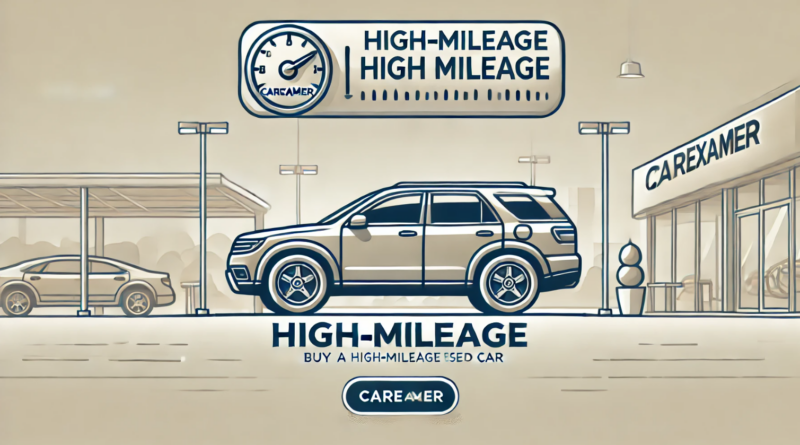Buying a High Mileage Used Car The Pros and Cons
Let’s break down the benefits and drawbacks of the pros and cons of buying a high-mileage used car help you decide if they’re the right fit for you. When shopping for a used car, seeing a six-figure number on the odometer might make you hesitate. But before you walk away, know this: high mileage doesn’t always mean a car is on its last legs. In fact, a high-mileage vehicle could be a fantastic option depending on your needs and budget.
What Does “High Mileage” Even Mean?
A car with more than 100,000 miles is generally considered high mileage, but that number isn’t the whole story. It’s all about how those miles were racked up. Highway miles, for example, are gentler on a car than stop-and-go city driving. And if the previous owner kept up with regular maintenance, a high-mileage car can still have plenty of life left.
Why High-Mileage Cars Can Be a Great Buy
They might not seem glamorous, but high-mileage cars have some serious perks—especially if you’re looking to save money.
1. They’re Way Cheaper
Let’s start with the obvious: high-mileage cars cost less than their low-mileage counterparts. If you’re on a tight budget or just looking for a good deal, a high-mileage car can stretch your money further. Only remember average usage a year is 10,000miles so every 10,000 ads additional year to the vehicle compared to low mileage car.
Why It’s Great:
You can often get a reliable car for a fraction of the price of a newer or low-mileage model.
2. They’ve Proven Their Reliability
A car with 100,000+ miles that’s still running well has likely been well cared for. It’s a testament to its build quality, especially if it’s a model known for longevity, like a Toyota Corolla or Honda Civic.
What to Look For:
Check the car’s service history to see if it’s been regularly maintained. A car that’s been taken care of is more likely to keep going strong.
3. Depreciation Isn’t a Big Deal
Cars lose value the fastest in their first few years. By the time a car hits high mileage, most of that depreciation has already happened. This means you won’t lose as much money if you decide to sell it later.
4. Insurance Costs Are Lower
Insurance premiums are often based on a car’s market value. Since high-mileage cars are worth less, you’ll likely pay less for coverage.
Who Benefits Most:
If you’re buying a car as a second vehicle or for a new driver, the lower insurance costs can be a nice bonus.
The Downsides of High-Mileage Cars
Of course, no car is perfect, and high-mileage vehicles come with their own set of challenges.
1. More Wear and Tear
High mileage means the car has been used—a lot. Components like the brakes, suspension, and transmission may be nearing the end of their lifespan.
What to Watch For:
- Worn-out tires.
- Leaky seals or gaskets.
- Noises that could signal trouble (like a whining transmission or squeaky suspension).
2. Repairs Might Be More Frequent
As cars age, they require more maintenance. High-mileage cars are no exception. While they might still run well, expect to deal with repairs sooner than you would with a low-mileage car.
How to Prepare:
Budget for potential repairs and make sure you have a trusted mechanic to help you out when issues arise.
3. No Warranty Coverage
Most high-mileage cars are past their original warranty period. This means any repairs or issues are fully on you.
Pro Tip:
Consider investing in an extended warranty if it makes financial sense, but read the fine print to ensure the coverage is worth the cost. Most extended warranties would not provide extended warranty or if they do very basic coverage will be provided.
4. Resale Value Is Lower
If you plan to sell the car later, be aware that its high mileage could make it harder to find buyers. That said, this isn’t a big issue if you’re buying the car to use for several years.
How to Choose the Right High-Mileage Car
If you’re thinking about buying a high-mileage car, a little homework can go a long way. Here’s what to do:
- Check the Service History: Look for consistent oil changes, brake replacements, and other regular maintenance.
- Inspect the Car Thoroughly: Bring along a mechanic or a friend who knows cars. They can help you spot red flags.
- Focus on Reliable Brands: Some brands are built to last, even with high mileage. Think Toyota, Honda, and Subaru.
- Ask About Major Repairs: Have parts like the timing belt or alternator been replaced? If not, factor those potential costs into your decision.
Who Should Consider a High-Mileage Car?
A high-mileage car might be the perfect fit if:
- You’re on a budget and need an affordable option.
- You’re looking for a second car for short commutes or weekend errands.
- You don’t mind a bit of maintenance in exchange for a lower upfront cost.
The Bottom Line
High-mileage cars aren’t for everyone, but they can be a great option if you know what you’re getting into. By focusing on the car’s condition, maintenance history, and overall reliability, you can find a vehicle that works for your needs—without blowing your budget.
So, don’t let a big number on the odometer scare you off. With the right research and preparation, a high-mileage car can be a smart, cost-effective choice that keeps you on the road without breaking the bank.
Buying a used VW. Buying used vauxhall, BMW, Jaguar, Ford, Volvo, Range rover, Bentley, Aston Martin, Porsche, Ferrari, Lamborghini, Maserati, Hyundai, Tesla, Honda, Pagani

